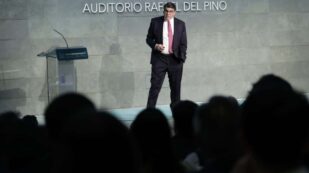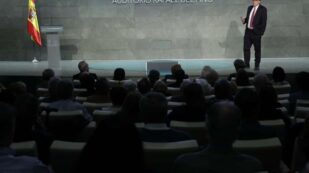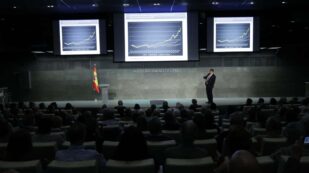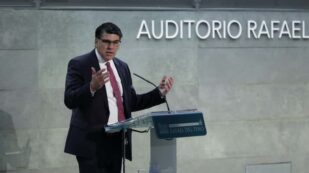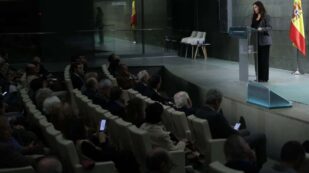From dot.coms to artificial intelligence: 25 years of stock markets in the US and Spain
Summary:
The teacher Tano Santos, Robert Heilbrunn Professor of Asset Management and Finance at Columbia Business School, gave the Keynote Lecture «From dot.com to artificial intelligence: 25 years of stock markets in the United States and Spain», an in-depth analysis of the evolution of stock markets over the last quarter of a century and the challenges posed by the current technological revolution.
Santos compared the performance of major international indices since 2000. He explained that, excluding dividends, the Ibex 35 and European indices have shown essentially flat performance, reflecting the reduced ability of European companies to generate profits and find large-scale investment opportunities. Against this, the US market has concentrated most of the growth thanks to companies able to reinvest capital in a massive and sustained way. The case of China, The market, on the other hand, is highly volatile, marked by speculative cycles, strong retail investor presence and real estate tensions.
To contextualise the current moment, the professor presented a more than 100-year historical perspective on stock market valuations and interest rates. He emphasised that current valuation levels in the US market are close to historical highs, which can only be explained by expectations of extraordinary future earnings or significantly lower expected returns.
Santos argued that, if it exists, the bubble associated with artificial intelligence would be “a tremendous bubble”, as it combines simultaneously:
- a technological component of enormous scale,
- a real estate component stemming from the rise of large data centres,
- strong financial leverage,
- and a growing involvement of the US government, which sees these investments as strategic in its technological competition with China.
Unlike during the dotcom bubble or the housing crisis, he warned that today there is less “dry powder”, i.e. less fiscal and monetary space to absorb an eventual shock.
The professor also highlighted the particular challenges of Europe and SpainThe lack of technology companies with global scale, shallower capital markets and dependence on bank credit, factors that limit the capacity for innovation and business growth. He also stressed the need to develop a strong and competitive asset management industry.
In the final part, he analysed the impact of artificial intelligence on asset management, market efficiency, skilled employment and the emerging role of the stablecoins in the financial system. He concluded by stressing the importance of closely watching the evolution of the new data centre economy and the technology transition for its ability to completely redefine the global financial landscape.
The Rafael del Pino Foundation is not responsible for the comments, opinions or statements made by the people who participate in its activities and which are expressed as a result of their inalienable right to freedom of expression and under their sole responsibility. The contents included in the summary of this conference are the result of the debates held at the meeting held for this purpose at the Foundation and are the responsibility of their authors.
The Rafael del Pino Foundation is not responsible for any comments, opinions or statements made by third parties. In this respect, the FRP is not obliged to monitor the views expressed by such third parties who participate in its activities and which are expressed as a result of their inalienable right to freedom of expression and under their own responsibility. The contents included in the summary of this conference are the result of the discussions that took place during the conference organised for this purpose at the Foundation and are the sole responsibility of its authors.
